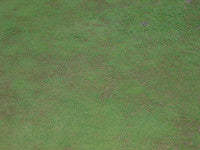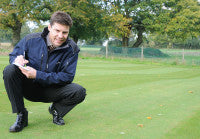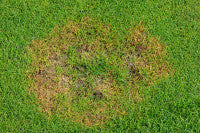Heat is on for summer turf disease
 Summer turf diseases can cause a serious loss in playing surface quality, especially when turf is under stress from environmental conditions and heavy play. Attacks of Anthracnose and Take-All can both increase with rising temperatures. Preventative applications of Heritage Maxx during periods of high risk can help to stop outbreaks causing visible damage.
Summer turf diseases can cause a serious loss in playing surface quality, especially when turf is under stress from environmental conditions and heavy play. Attacks of Anthracnose and Take-All can both increase with rising temperatures. Preventative applications of Heritage Maxx during periods of high risk can help to stop outbreaks causing visible damage.
Rising temperatures will be likely trigger a high risk of Anthracnose (foliar blight) attack on fine quality turf at any time over the coming weeks, according to Dr Simon Watson of Syngenta. He warns that turf stressed by the prolonged hot dry weather in the south and east, or the extreme wet weather in parts of Scotland and the north of England, will have made turf more susceptible to attack.
"Many types of stress predispose turf to Anthracnose outbreaks, including drought, inadequate nitrogen, insect or nematode feeding. Excessively low cutting heights and compaction make turf particularly susceptible to attack," advises Dr Watson. "Anthracnose is most severe on annual meadow-grass, but the foliar form of the disease affects most turfgrass species including Bentgrass and Fescue."
He reminds greenkeepers and course managers to remain alert for conditions conducive to disease, especially high wear areas dominated with annual meadow grass and where outbreaks have been experienced in the past. "When turf is under stress over the summer it is crucial to get a preventative fungicide application on before symptoms are seen," he says. "The systemic activity of Heritage Maxx is an excellent option as the preventative fungicide for the summer."
 Additionally, Dr Watson highlights that turf managers should be taking all possible measures to alleviate stress, including raising cutting height, ensuring there's sufficient nutrition and moisture and, where appropriate, aeration is carried out to relieve compaction. Primo Maxx applications will also help reduce the effects of stress. With Poa annua the most susceptible turf species, he advocates a longer-term a move to Bentgrass or Fescue dominant turf is desirable.
Additionally, Dr Watson highlights that turf managers should be taking all possible measures to alleviate stress, including raising cutting height, ensuring there's sufficient nutrition and moisture and, where appropriate, aeration is carried out to relieve compaction. Primo Maxx applications will also help reduce the effects of stress. With Poa annua the most susceptible turf species, he advocates a longer-term a move to Bentgrass or Fescue dominant turf is desirable.
Dr Watson highlights that Heritage Maxx and Headway applications in June or early July can also provide valuable protection against outbreaks of Take All that are becoming increasingly prevalent on affected fine turf.
"The visual effects and impact on surface quality makes Take All one of the most damaging summer turf diseases. It can take months and repeated over sowing operations to restore but, if left untreated, is almost inevitably going to reoccur when conditions are right." The recommendation for areas susceptible to Take All is typically two treatments of Heritage Maxx or Headway, applied with a two week interval when there are risk conditions.
Dr Watson reports research in the US, led by Dr Mike Fidanza of Penn State University, indicates that applying Heritage Maxx in sequence with a wetting agent can further enhance results in controlling soil borne fungal diseases. Irrigation or rainfall after application also appears to aide getting the fungicide down to the root zone.
 "The advantage with Heritage Maxx and Headway is that the active ingredient is readily taken up by the turf roots and, with its genuine systemic properties, moves back up through the plant, which will further strengthen the control of foliar diseases such as Anthracnose.
"The advantage with Heritage Maxx and Headway is that the active ingredient is readily taken up by the turf roots and, with its genuine systemic properties, moves back up through the plant, which will further strengthen the control of foliar diseases such as Anthracnose.
"This active recycling of protection gives enhanced long-term results over the summer whilst turf is actively growing, and when contact or local penetrant type fungicides would be quickly mown off and lost," he says.
Greenkeepers and turf managers can receive free local five-day warning of disease risk for Take All, Anthracnose and other key turf diseases - along with a wealth of other valuable turf management advice and information - on the website www.greencast.co.uk
Rod Burke Dr Simon Watson
Syngenta Turf & Landscape Syngenta Turf & Landscape Technical Manager
Tel: 01223 883468 Tel: 01223 883441
Email: rod.burke@syngenta.com Email: simon.watson@syngenta.com
For more information about us please go to www.syngenta.com
For UK specific turf agronomy and product information go to www.greencast.co.uk
